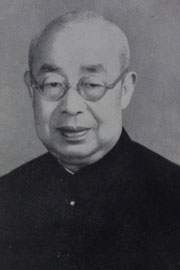

Sinology Master Cheng Faren (1894-1975) |
||||
Cheng came to Taiwan in 1949 after he was appointed by President Liu Zhen of the Taiwan National College of Education to take up posts as a professor in the Department of Chinese as well as Director of General Affairs. After the Taiwan National College of Education became NTNU, Cheng was appointed director of the night school and chairman of the Department of Chinese. As Director of General Affairs of the college, Cheng realized that the small size of the campus would limit future development. He applied to the provincial government for a piece of land across from the campus as the future site for the college preparatory school. This land was later used for the subsequent construction of the library, College of Education, Industrial Education Building and other infrastructure. The current scale of the university is mainly due to the efforts of Cheng. He was also the founding father in the establishment of the NTNU night school. As the chairman of the Department of Chinese, he increased the number of classes, appointed highly-qualified staff, raised academic standards and expanded the coverage of departmental affairs; Cheng's efforts developed Chinese teachers for the later "nine-year compulsory education", contributing greatly to Chinese language education in Taiwan. Cheng was an expert in Sinology and completed many works over several decades. He was a diligent writer and pundit with extensive knowledge of the past and the present. Cheng specialized in evolutional geography, the study of Zuo Zhuan (the Chronicles of Zuo), and the Chinese ancient calendar system. By using the ancient calendars he deducted that Confucius was born five days after the Autumn equinox, (September 28) and not August 27 as posited by the lunar-solar calendar conversion of 1934. This fact was verified by experts Ping Tse-kao and Dong Zuo-bin and then presented to the President through the Executive Yuan by the Ministry of Interior and Ministry of Education. On August 18, 1952, it was announced that the Birthday of Confucius and Teachers' Day would fall on September 28. 1. Honors
Cheng's work "Annals on the location names in the Chronicles of Zuo" is composed of around 300,000 words. The content focuses mainly on correcting the inaccurate interpretations of Du Yu and includes 24 original ideas. It received the 1969 Ministry of Education Literature Award. "Annals on the Sino-Russian Borders" includes exhaustive research and verification on the content, whether it's the details of the 21 concluded treaties and agreements between China and Russia, the locations of the 271 boundary markers or the map of the over 11,000 km of border between the two countries. It received the 1971 Award of The Sun Yat-Sen Cultural Foundation. 2. Contributions to Education After Cheng came to Taiwan, he taught in the Department of Chinese and he was also the department chairperson for over 11 years. He lectured on the Chronicles of Zuo, The Tenor of Chinese Classics, Historical Trends of Chinese Scholarship, and evolutionary geography. Cheng's life goal was education, to train many experts so that the nation could be stronger.
|
||||



















 Sinology Master Cheng Faren (1894-1975)
Sinology Master Cheng Faren (1894-1975)